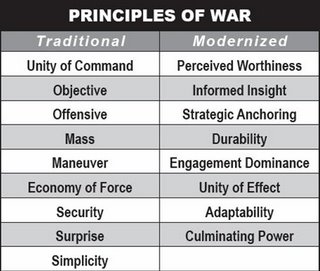After all, in a society that values its people more as consumers of products than as civic-minded citizens, the fact that the masses have been kept in a state of suspended intellectual animation is hardly surprising.--- Tim Wise, Counterpunch
6.13.2006
q.o.t.d.
6.09.2006
germany 4 costa rica 2
6.07.2006
holy shit
taken from a scientific american mind article:
"The term "burnout syndrome" was coined in the early 1970s by Herbert J. Freudenberger, a New York psychoanalyst. Freudenberger had noticed that his own job, which was once so rewarding, had come to leave him feeling only fatigued and frustrated. Then he noticed that many of the physicians around him had, over time, turned into depressive cynics. As a result, those doctors increasingly treated their patients coldly and dismissively.
Freudenberger soon began looking at examples outside of health care — and found similar cases in many professions. Afflicted people suffered from mood fluctuations, disturbed sleep and difficulty concentrating. Accompanying the mental distress were physical ailments such as backaches or digestive disorders. Freudenberger defined burnout syndrome as a state of mental and physical exhaustion caused by one's professional life."
how bout being broke and unemployed to bring that on.
to see or not to see?
1. open this pdf file
2. go to page 5 (to see neutral woman and angry man images)
3. view the images at 100% zoom
4. zoom out in steps all the way to, say, 10% or even lower
the images gradually change from one to the other!
why? well you can read the paper to find out. basically they are hybrid images combining the two sets of information (angry man and neutral woman), one set filtered to contain only "low spatial frequencies in Fourier space" and the other set filtered to contain only high spatial frequencies. (in layman's terms, it's blurry or sharp.) anyway, staring at close range, high frequency or sharp features are more noticeable, masking any information encoded in the large scale, whereas once you move far away sharp features are less dominant allowing the low frequency information to be drawn out, perceived, if you will. it's sort of the same principle as squinting to see a pixelated picture better.
recently a neurobiologist at Harvard Med noticed those underlying mechanisms at work in the mona lisa painting. whereas art historians and the like (cue marc's eye roll of phycisist's condescension) argue back and forth about mona lisa's enigmatic smile, said scientist proved that mona lisa is both smiling and not smiling at the same time , albeit at different spatial frequencies because of some clever shading at the corners of the mouth. she predicted this by looking directly and indirectly at the painting, then proved it by taking low and high pass filters of the image. ha! of course it would take a scientist to resolve an art "mystery."
6.06.2006
quota
hooray reality.
but what does this imply for the blog? well. not curtains. definitely not certain death. but certain dearth probably. as the internet don't grow on trees in the third world. hahaha, i find it funny that i am worried about not having regular internet access when i should be thinking of finding a place to live in trinidad! i literally can't fit in the old apt. no desire to sleep on a couch or have to *share* a room *smaller* than my current studio with another twenty something year old. i'm thinking of crashing by an aunt for a while. see if i can get work. and then see what happens from there. lots of seeing to do. and perhaps some rum and marijuana to dull the pain of the impending tedium. cuz i'll tell ya, there is nothing interesting to do. on the brighter side, i will not be prevented from entering clubs, or be mistaken for an employee working the aisles at target, based on my appearance. ooh... appearance. i will be brown again. one thing to smile about.
6.05.2006
kissinger on china
You’ve become one of the world’s great experts on China since you first visited there in 1971. There seems to be a looming problem with China, as there was with Japan ten or fifteen years ago. Is China becoming so powerful it will endanger U.S. interests?
In the United States, there’s always a temptation to believe that we can write the course of history, that it’s entirely up to us to decide whether a country is powerful, less powerful, whether it is helpful to us or not. And one of the fundamental lessons we have to learn is that we are moving into a world in which a lot of things are happening that we cannot control. We can shape, but we cannot prevent China from becoming a major country. We can slow it down and then pay the consequences ten to twenty years down the road, and policymakers have every right to consider that. But fundamentally, China is going to emerge as a major power in Asia. Secondly, the center of gravity of the world is going to shift from the Atlantic to the Pacific. Those are realities.
Then we have to ask the policy question: Do we want to slow down that process at the risk of producing a generation of Chinese considering us to be the biggest obstacle of their national endeavors? Or do we want to signal an attitude of cooperation while defending specific American interests when they are being challenged? That we must always do. I tend to lean toward the second course. I believe also that a new equilibrium will emerge in Asia, and if we want to be relevant to that, it is wiser to do it from a posture of cooperation with China than from a posture of trying to recreate the Cold War, because in the second course, all the countries around China will be forced to choose and we will be blamed for putting them in a position where they are forced to choose. It will weaken our position in those countries, rather than strengthen it.
[from http://www.cfr.org/publication/8255/kissinger.html]marc = warlike?

"In security matters, intellectual stasis could be fatal. The great danger today, for example, is assuming that the irregular warfare of current conflicts is the inescapable template for future wars... Finally, we must continue to search for peace even as we prepare for war. We can hope that the melancholy belief that "only the dead have seen the end of war" is wrong, so long as we always realize that hope is not a principle of war."
6.02.2006
today's catholic news
after some hurried consultation, cardinals in rome decided that god had made man with too many ribs and each man had to get rid of one or two. "there was a rib feast at which all men cast their surplus viscera-protectae" into a hot water spring in eden. apparently women may have evolved from this sea of cartilaginous tissue and bone. whether god infused women with souls the church researchers would not say. "it may have been that he tried to but perhaps he was out of breath at the time," said one cardinal. "what is certain is that satan himself designed the clitoris."
overheard in Mmail
M: "the only way to know for sure how much of a clone you are is to take a "ς"* measurement.*ς is a measurement of eye-chinkyness. it is alleged that as you clone more clones from clones, their eye-chinkyness increases in proportion with the decrease in soul percentage which falls off like e^-N where N is the degree of cloning. this implies that as you get to N=5, your clone subject is almost a fully formed soulless asian."
half human/half ecosystem
excerpts from Article:
"In a study published in the June 2 issue of Science , scientists at The Institute for Genomic Research (TIGR) and their colleagues describe and analyze the colon microbiome, which includes more than 60,000 genes--twice as many as found in the human genome. Some of these microbial genes code for enzymes that humans need to digest food, suggesting that bacteria in the colon co-evolved with their human host, to mutual benefit."
"How many unique bacterial genera or species exist in the colon community? By comparison to the outside world, Gill suspects the human gut is at least as complex as our soils or seas."
6.01.2006
strange creatures found in israeli cave
see Article
contrary to popular belief the creatures have not been swimming around lost in the cave system for 400 years questioning their existence or concocting a theistic system of belief.






